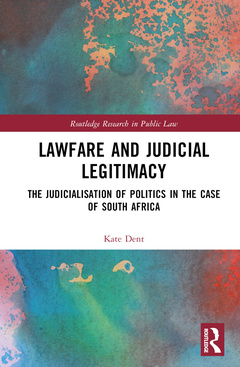Lawfare and Judicial Legitimacy The Judicialisation of Politics in the case of South Africa Routledge Research in Public Law Series
Auteur : Dent Kate

Lawfare is a complex and evolving concept with many permutations. It is a term that is used to describe both a judicialisation of politics where the Constitutional Court is called upon to uphold constitutional responsibilities, compensating for institutional failures in the broader democratic space, and instances where there is abuse of the legal process to escape accountability. When the court is dragged into politics, it forces an examination of the legitimate scope of judicial review. This book explains how judicialisation of politics leads to the politicisation of adjudication and further weaponisation of the law. Exploring the judicial-political dynamics of South Africa from 2009 onwards, the work traces the consequences of the judicialisation of politics for institutional resilience and broader constitutional stability. Through an in-depth study of judicial legitimacy, the book seeks to provide an overarching theoretical justification for the dangers that inhere in lawfare. It analyses the potential costs of both judicial statesmanship and strategies of deference and avoidance when trying to navigate the Court safely through the era of lawfare. South Africa offers an interesting crucible within which to observe an unfolding global trend. Strengthened by its comparative focus, the implications of lawfare presented in this book transcend the South African context and are applicable to other jurisdictions in the world. The book will be of interest to researchers, academics and practitioners working in the areas of Constitutional Law and Politics.
Preface
1 Introduction
Lawfare and its permutations
Lawfare in the international space
Lawfare by insurgents
Lawfare as a tool of authoritarianism
Lawfare and the judicialisation of politics in South Africa
Dominant party democracy
The Constitutional Court’s unsettled role
This book’s approach
Constitutional resilience
2 The multiple dimensions of judicial legitimacy
Concepts of legitimacy
Political legitimacy
Sociological legitimacy
Legal legitimacy
Moral legitimacy
Conflict and interconnections
Legitimacy and judicial-political dynamics
Conclusion
3 The judicialisation of politics
The “political”
The institutional heritage of the legalisation of politics
Reasons for judicialisation
The nature of a Constitutional Court
Constitutional patriotism
Constitutional design
Rights culture
Administrative justice weaknesses
Undoing unlawfulness unlawfully
Abdication and institutional failings
Institutional power imbalances
Acquiescence to judicial power
Making a distinction
Conclusion
4 Consequences of judicialisation
Political attack
Separation of powers, relationships and conversations
Backlash, curtailment and judicial retreat
Dominance and dysfunction
Abusive constitutionalism
Judicialisation of politics and declining dominance
Impunified disregard
Conclusion
5 Politicisation of law: The judicial view
Judicialisation of politics: effect on the judicial environment
Enfolding the lower courts
Judicial appointment
Acting judges
Commissions of inquiry
Pervading influence, depleting responsibility
Shifting blame
Conclusion
6 The difficulty in achieving judicial effectiveness in a judicialised climate
Non-compliance
Conditions of effectiveness
Judicialisation and the political salience of the case
Clear legal authority
Division and dissent
Remedial action in institutional suits
Authoritative legitimacy
Conclusion
7 Tracing the legitimacy of intervention strategies
Operating in hostility
The formalist response
Detachment
Responsiveness
Judicial statesmanship, responsiveness and the rule of law
Judicial review and democratic legitimacy
Holding public power to account
The legitimacy of intervention
The judicial response to lawfare tactics
Conclusion
8 The Office of the Public Protector and the Court: A wicked problem case study
Nkandla
The effect of the CC’s Nkandla Judgment
State capture
Unintended consequences
Personal cost orders and a motion of no confidence
Analysis
Conclusion
9 Conclusion
Where things stand
The South African crucible
Laws authority
From “illegitimacy” to legitimacy
From legitimacy back to illegitimacy
Judicialisation and identity politics
The only sure bulwark
Bibliography
Index
Kate Dent received her doctorate from the School of Law, University of Cape Town, South Africa.
Date de parution : 07-2023
15.6x23.4 cm
Disponible chez l'éditeur (délai d'approvisionnement : 14 jours).
Prix indicatif 160,25 €
Ajouter au panierThèmes de Lawfare and Judicial Legitimacy :
Mots-clés :
Law; Jurisprudence; Judicial Political Dynamics; Constitutional law; Administrative Law; Judicial Review; Judicial Legitimacy; Authoritative Legitimacy; Cc; Sociological Legitimacy; JSC; ANC; Judicial Statesmanship; President Zuma; South African Constitutional Court; Western Cape High Court; South Africa; Remedial Order; Dominant Party Democracy; South Africa's Constitutional Democracy; Public Protector; MEC; South African Jurisprudence; Civil Society; UN; South African Social Security Agency; Basic Structure Doctrine; Tolerance Interval; Legal Legitimacy; Gauteng High Court



